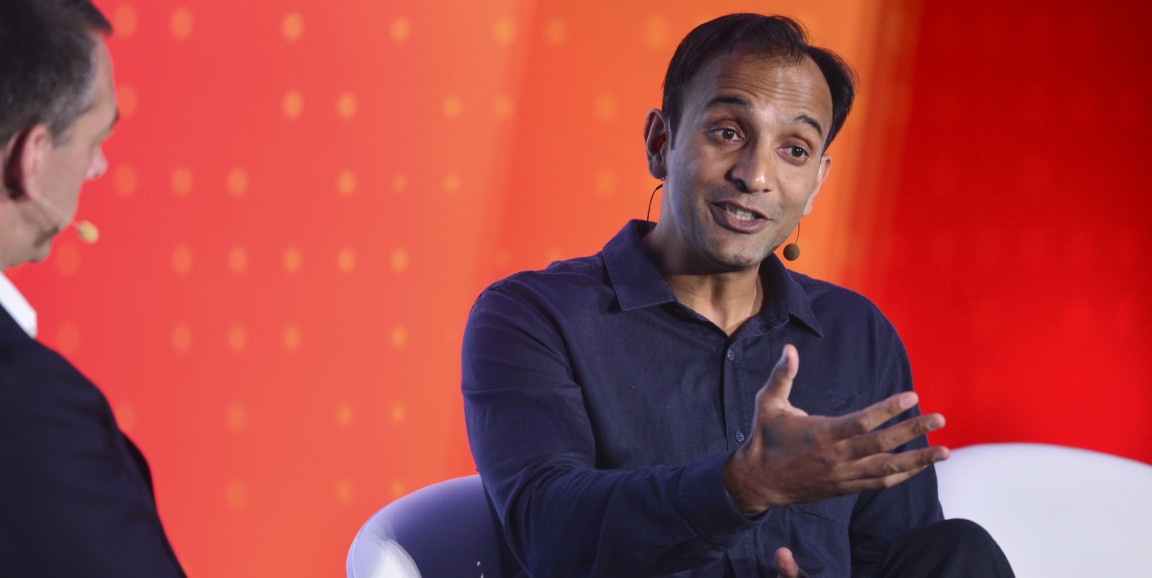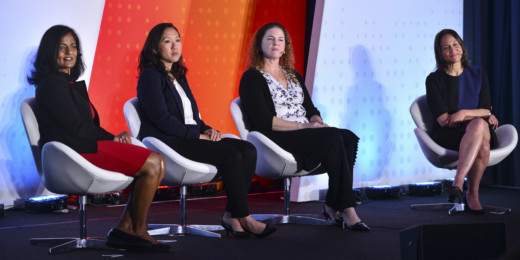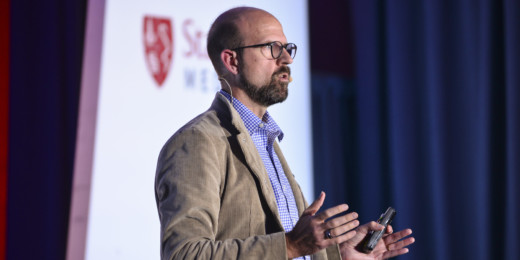It took some time before DJ Patil, PhD, former U.S. chief data scientist, found his groove in data science.
As a kid in high school, Patil wasn't exactly acing his math classes. "To say I was a bad student would be kind," Patil told the audience at the Big Data in Precision Health conference on Thursday, during a conversation with Euan Ashley, MD, professor of medicine. "I think six weeks into high school, I was already read my rights, suspended and kicked out of math. I'd failed out and had to retake algebra in summer school."
Patil eventually found himself at De Anza Community College not far from Stanford, where he said he had two main things going for him: California's community college system, and his girlfriend. "I took all the classes she took, so when she signed up for calculus I was like, 'Okay I'll take this calculus class.'" Patil quickly realized he had some catching up to do and went to his local library, where he checked out every math book he could.
After a few days -- yes days -- Patil was caught up on algebra. He excelled in mathematics and statistics from then on, eventually earning a PhD in applied mathematics from the University of Maryland.
His career has taken him from a strategy and analytics director at eBay (a position for which he thanks his mom, who convinced the then-president of the company to take an interview with Patil), to a data science lead at LinkedIn, to the country's foremost data science job, chief data scientist for the Obama administration.
"I got the call [from the White House] one day to put my hat in the ring for U.S. CTO [chief technology officer]," said Patil. He went through the application and evaluation process, along with three other data scientists who happened to be three of his closest friends. In the end, another scientist got the role, but Patil was offered a new position created just for him -- one that would lead data science work focused on societal and population health issues for the American public. But Patil had several other projects he was ready to pursue and decided to pass on the offer.
Not one to give up easy, President Barack Obama called for backup.

"I got a call saying that the president wanted to meet with my wife," said Patil. To Washington they went, and President Obama proceeded to convince Patil's wife that Patil's new job should be as the chief data scientist. "There's nothing more awkward than sitting in a room in between the president and your spouse, with both of them completely ignoring you."
In the end, Patil was grateful for the extra nudge, and through his tenure at the White House launched several initiatives that harnessed immense datasets to address issues in public health, the justice system and more.
In one example from Patil's work, he and his team started the Crisis Text Line, a service to help individuals who are contemplating or actively pursuing suicide. "That program saved on average six or seven lives per night," Patil said. By simply texting a hotline number, the individual would be connected with a volunteer trained in helping those with suicidal thoughts. One of the reasons the team is able to handle incoming texts so efficiently, Patil said, is because they used the anonymized text as data, mining more than 100 millions messages for insights to improve care.
"We found that when a text comes in with the words 'Tylenol' or 'aspirin' in certain contexts, those individuals are 4-15 percent more likely to be in the act of suicide in that moment," said Patil. "So that tells us to reroute them and prioritize them in the cue so that they can get help right away."
In his data science work, Patil said that diversity and inclusion are among his top priorities. He's particularly eager to include female data scientists. "There are a couple lessons that I learned for which I really have to give credit to President Obama," said Patil. One person can't make decisions for all of America, he said, because one person can't possibly represent all of America. Decision makers need to reach out to all types of people for input.
"What happens when you bring victims of domestic violence into the conversation? Or a veteran? Or someone who doesn't have access to health care?" Patil posited. "What happens when you consult someone who has been harmed by the use of data -- like DACA kids, who are having data used against them now?"
The end result is always better, he said. "I can't tell you the number of times that decisions were made better by someone asking 'Have you thought about it like this?' and I said, 'No I hadn't, educate me, help me understand that.'"
Now, Patil is working with DevotedHealth, a company that offers Medicare Advantage plans. He's said he's currently focused on helping disadvantaged people gain access to health care.
Photos by Rod Searcey






